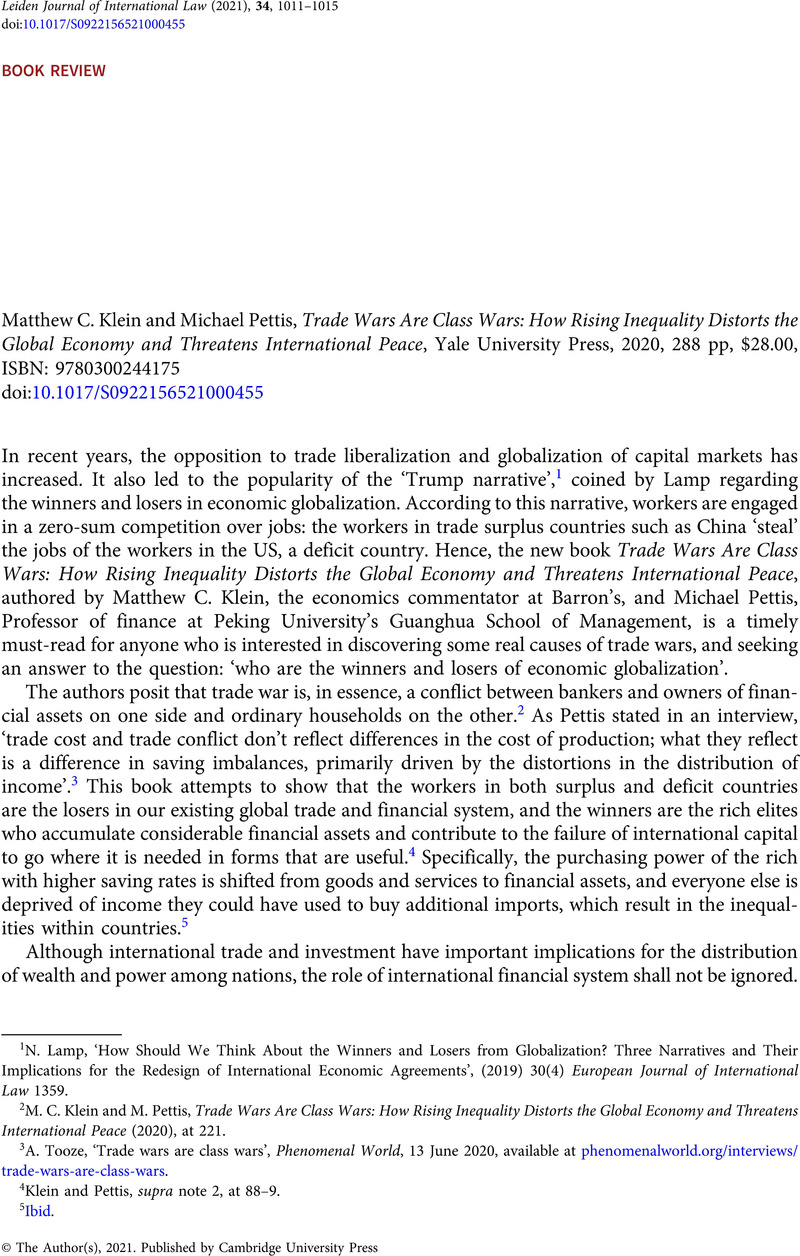No CrossRef data available.
Published online by Cambridge University Press: 25 August 2021

The author is grateful to Professor Robert Howse for his helpful and insightful comments on the earlier draft and the references he suggested. The author also thanks the independent reviewer and the editor of the Leiden Journal of International Law for their diligent and conscientious editing and helpful remarks. The author is solely responsible for all mistakes.
1 N. Lamp, ‘How Should We Think About the Winners and Losers from Globalization? Three Narratives and Their Implications for the Redesign of International Economic Agreements’, (2019) 30(4) European Journal of International Law 1359.
2 M. C. Klein and M. Pettis, Trade Wars Are Class Wars: How Rising Inequality Distorts the Global Economy and Threatens International Peace (2020), at 221.
3 A. Tooze, ‘Trade wars are class wars’, Phenomenal World, 13 June 2020, available at phenomenalworld.org/interviews/trade-wars-are-class-wars.
4 Klein and Pettis, supra note 2, at 88–9.
5 Ibid.
6 S. Strange, Casino Capitalism (1986). See also T. Piketty, Capital in the Twenty-First Century (2014).
7 Klein and Pettis, supra note 2, at 85.
8 Ibid., at 68.
9 While the rich may spend more on luxury goods and services that workers and pensioners cannot afford, most savings are spent on financial assets with high returns, which may also lead to less investment in real economy for example infrastructure projects in many countries.
10 Klein and Pettis, supra note 2, at 68.
11 Ibid., at 159.
12 Ibid., at 164. The analysis of Klein and Pettis about German under-consumption and German banks’ over-lending is part of the Euro crisis tale. Joseph Stiglitz points out that a range of measures, including austerity and bailouts in response to the Euro crisis, were directed towards the protection of the interests of large financial institutions, mostly in surplus countries, rather than workers in crisis countries, which became another key externality contributing to the Euro crisis. See J. E. Stiglitz, The Euro: How A Common Currency Threatens the Future of Europe (2016). See also R. Howse, ‘Economics for Progressive International Lawyers: A Review Essay’, (2017) 5(1) London Review of International Law 187.
13 Klein and Pettis, supra note 2, at 229.
14 Ibid., at 231.
15 Ibid., at 104.
16 Ibid., at 108.
17 Ibid., at 227.
18 Ibid.
19 Ibid., at 68.
20 D. Rodrik, ‘Industrial Policy: Don’t Ask Why, Ask How’, (2008) Demo issue Middle East Development Journal 1.
21 R. Howse, ‘Making the WTO (Not So) Great Again: The Case Against Responding to the Trump Trade Agenda through Reform of WTO Rules on Subsidies and State Enterprises’, (2020) 23(2) Journal of International Economic Law 1.
22 Klein and Pettis, supra note 2, at 124.
23 Ibid., at 68.
24 Ibid., at 46–55, 50, 124, 190, 218.
25 Ibid., at 125.
26 International Monetary Fund, Policies to Support People during the Covid-19 Pandemic (2020), Fiscal Monitor No. 2020/001, Ch. 3.